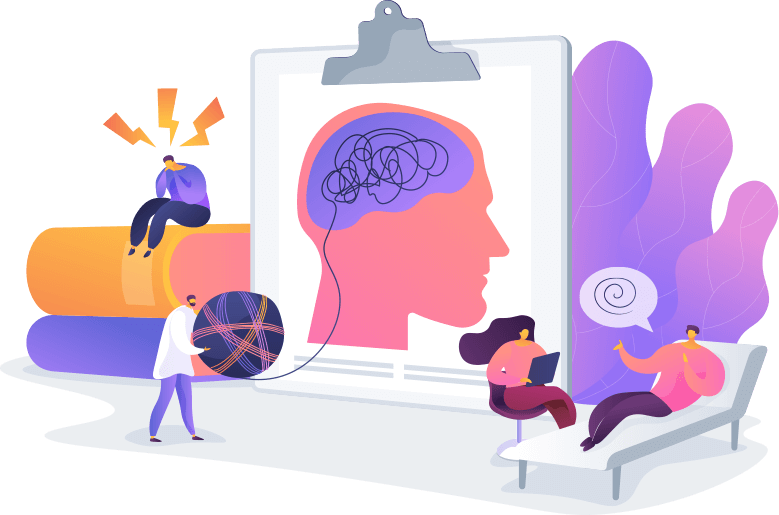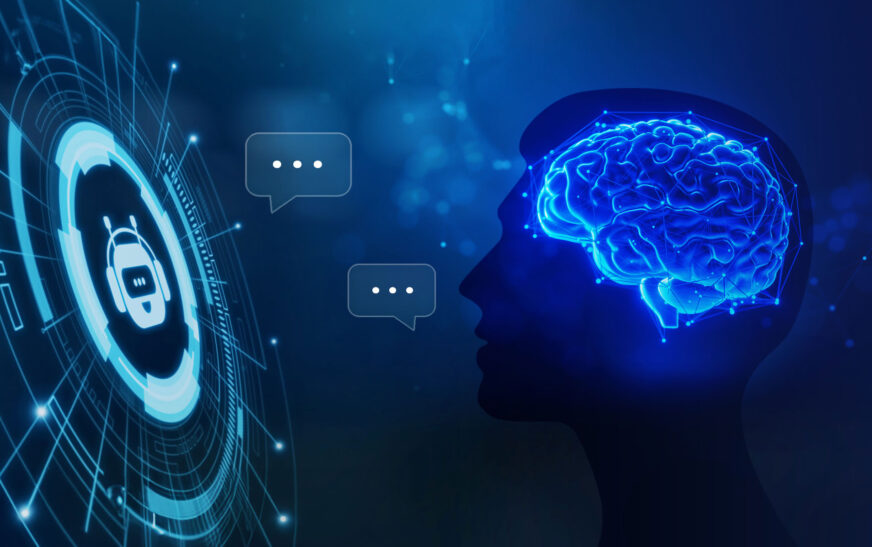Introduction: Revolutionizing Mental Health Care with AI
The world is undergoing a mental health crisis, with millions of individuals experiencing stress, anxiety, depression, and other mental health conditions. According to the World Health Organization (WHO), mental health disorders are the leading cause of disability worldwide, affecting one in four people at some point in their lives. Despite the increasing demand for mental health support, there is a shortage of qualified mental health professionals, leading to long wait times and limited access to care. In this context, AI in mental health is emerging as a transformative tool to bridge the gap between mental health needs and available services.
AI-powered mental health chatbots are at the forefront of this change, offering accessible, affordable, and scalable mental health support. These AI mental health chatbots are becoming an essential component of digital therapy tools that provide immediate assistance to individuals struggling with mental health issues. In this blog, we will explore the rise of AI in mental health therapy, its benefits and limitations, and the ethical considerations surrounding its use in psychological treatment.
How are AI Chatbots Used in Mental Health Therapy?
AI chatbots, specifically designed for mental health, serve as digital therapy tools that simulate human-like interactions to provide emotional support, mental health guidance, and therapeutic exercises. These chatbots utilize natural language processing (NLP) algorithms, machine learning, and AI-powered analytics to engage with users, analyze their emotional state, and provide personalized interventions based on the individual’s mental health needs.
Key Functions of AI Chatbots in Mental Health Therapy:
- Emotional Support: AI chatbots provide a safe and non-judgmental space for users to express their feelings, helping to alleviate loneliness and distress. They can engage in conversations about stress, anxiety, depression, or other mental health challenges.
- Cognitive Behavioral Therapy (CBT): Many AI mental health chatbots are designed to guide users through evidence-based therapeutic exercises, such as Cognitive Behavioral Therapy (CBT). These exercises help individuals identify negative thought patterns and replace them with healthier alternatives.
- Mindfulness and Meditation: Some chatbots provide relaxation techniques, mindfulness exercises, or meditation practices to help users manage stress and anxiety.
- Symptom Tracking: AI-powered chatbots can track a user’s mood, emotional state, and symptoms over time. By analyzing this data, the chatbot can offer tailored recommendations and notify users when it’s time to seek professional help.
Examples of AI-Driven Mental Health Applications:
- Woebot: Woebot is an AI chatbot that uses CBT to guide users through emotional challenges. It’s been shown to be effective in reducing anxiety and depression symptoms.
- Wysa: Wysa combines AI with human expertise to provide mental health support. It offers emotional support, coping strategies, and connects users with mental health professionals when necessary.
- Replika: Replika is an AI chatbot that focuses on building emotional intelligence through conversations. It allows users to vent and engage in supportive dialogues.
Benefits of AI in Mental Health Support
The use of AI in mental health is rapidly gaining traction for its potential to revolutionize the field. AI-powered tools, including chatbots, have numerous benefits for both individuals and healthcare providers, particularly in addressing the growing demand for mental health services.
1. Accessibility and Availability
AI-powered chatbots are available 24/7, providing immediate support whenever users need it. This is particularly beneficial for individuals in underserved areas or those unable to access in-person therapy due to geographic, financial, or time constraints.
2. Cost-Effective
Traditional therapy sessions can be expensive, and many individuals may not have the financial resources to afford regular appointments. AI mental health tools are typically more affordable and can offer continuous support without the cost of traditional therapy.
3. Reducing Stigma
Mental health issues are often stigmatized, preventing individuals from seeking help. AI chatbots provide a level of anonymity that allows individuals to discuss sensitive topics without fear of judgment. This can encourage more people to seek help.
4. Scalability
AI chatbots are capable of assisting millions of users simultaneously, making it easier to scale mental health support. Healthcare providers can integrate healthcare automation software with AI chatbots to provide consistent and personalized care at scale.
5. Complementing Human Therapists
AI chatbots are not meant to replace human therapists, but they can serve as a supplemental tool. They provide an additional layer of support between therapy sessions, offering ongoing assistance and monitoring symptoms.
Limitations of AI in Mental Health Support

Despite the promising benefits, AI-powered chatbots and digital therapy tools do have limitations. It’s important to consider these challenges before fully integrating AI into mental health care.
1. Lack of Human Empathy
While AI can mimic human-like conversations, it lacks true emotional empathy. Chatbots can’t fully understand the depth of human emotion or provide the nuanced, empathetic responses that a trained therapist can offer.
2. Privacy Concerns
Mental health data is highly sensitive, and using AI chatbots for mental health support raises concerns about data privacy and security. Ensuring that clinical data management practices comply with regulations such as HIPAA (Health Insurance Portability and Accountability Act) is essential to protect patient privacy.
3. Inability to Handle Severe Cases
AI chatbots are designed to provide basic mental health support and cannot handle severe psychiatric conditions, such as schizophrenia, bipolar disorder, or suicidal ideation. Users with more complex mental health needs should be directed to a licensed mental health professional.
4. Ethical Issues
The ethical implications of AI in mental health treatment are still being debated. Concerns include the potential for over-reliance on AI, inadequate regulation, and the risk of providing misleading or incorrect advice. Developers must ensure that AI systems are transparent, accountable, and designed to prioritize the well-being of users.
Ethical Considerations of AI in Psychological Treatment
As AI becomes increasingly integrated into psychological treatment, it’s crucial to address the ethical concerns surrounding its use. Ethical considerations include:
1. Informed Consent
Users should be made fully aware of the capabilities and limitations of AI chatbots. Informed consent is essential to ensure that users understand that they are engaging with an AI tool rather than a licensed therapist.
2. Data Privacy
Ensuring the confidentiality and security of mental health data is critical. AI developers must adhere to strict privacy standards, especially when dealing with sensitive patient data, to maintain trust and protect users.
3. Accountability
When AI systems provide therapeutic support, questions arise about who is responsible for any potential harm caused by incorrect advice or misdiagnoses. Clear accountability frameworks should be established to ensure that AI systems are used ethically.
Case Studies of AI in Mental Health
Real-world case studies demonstrate the potential of AI in mental health to improve outcomes and make therapy more accessible.
1. Woebot Health
Woebot Health is an AI-driven chatbot that uses CBT techniques to help users manage anxiety and depression. According to a study published in the journal JMIR Mental Health, users who interacted with Woebot showed significant reductions in anxiety and depression symptoms over a 4-week period. Woebot’s ability to provide personalized, real-time support has made it a popular choice for individuals seeking mental health assistance.
2. Wysa
Wysa, an AI-driven mental health platform, has helped users cope with stress, anxiety, and depression through conversational agents. Wysa reports that 74% of its users have experienced a reduction in anxiety and depression symptoms after using the app for several weeks. The app integrates AI with human support to offer a comprehensive mental health solution.
User Experience: The Role of AI Chatbots in Mental Health
User experiences with medical AI chatbot in mental health therapy vary depending on the platform and the user’s needs. Many users report feeling comforted and relieved by the non-judgmental space that AI chatbots provide. For instance, a user of Woebot mentioned that the chatbot helped them understand and manage their anxiety symptoms more effectively. The user appreciated the personalized feedback and felt more in control of their mental health.
Others, however, have expressed concerns about the limitations of AI in addressing deeper emotional issues. While AI chatbots can provide immediate support, users with complex mental health conditions may require more specialized care from human professionals.
Conclusion: The Future of AI in Mental Health Therapy
AI in mental health has the potential to revolutionize the way mental health support is delivered. From offering immediate emotional support to providing structured therapeutic exercises, AI-powered tools are making mental health care more accessible, scalable, and affordable. However, while these tools offer significant benefits, they are not without limitations. As AI continues to evolve, it is crucial that ethical guidelines and data security measures are put in place to ensure the responsible use of these technologies.
As mental health awareness continues to grow, AI-powered mental health chatbots will play an increasingly important role in providing support to individuals worldwide. The future of mental health care is undoubtedly digital, and AI is poised to lead the way.
FAQs: Addressing Common Questions about AI in Mental Health
How are AI chatbots used in mental health therapy?
AI chatbots in mental health therapy provide emotional support, guide users through therapeutic exercises such as Cognitive Behavioral Therapy (CBT), and offer personalized coping strategies. They help users track symptoms, provide relaxation techniques, and offer a safe space for conversation.
What are the benefits and limitations of AI in mental health support?
The benefits of AI in mental health support include accessibility, affordability, and scalability. However, limitations include a lack of true empathy, privacy concerns, and the inability to handle severe mental health
conditions.
What is the role of Healthcare Automation Software in mental health therapy?
Healthcare Automation Software integrates AI systems with patient management platforms to streamline administrative tasks and enhance data analysis. It plays a key role in ensuring efficient data management and improving the overall efficiency of mental health care delivery.
Can AI chatbots replace human therapists?
No, AI chatbots are meant to supplement, not replace, human therapists. While AI can provide immediate support, it cannot replace the nuanced and empathetic care provided by trained professionals.









